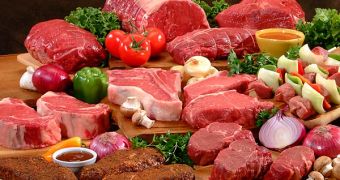A report published in the journal Proceedings of the National Academy of Science this past Monday shows that the practice of raising animals for meat, eggs and dairy releases loads of greenhouse gases emissions on a yearly basis. Hence, it is a major contributor to climate change and global warming.
A new paper in today's issue of journal Nature Climate Change offers a solution to this problem.
Long story short, researchers say that making meat – especially meat from ruminants – more expensive is likely to yield noteworthy benefits in terms of reducing greenhouse gases emissions and thus limit the effects of said phenomena.
The international team of specialists who authored the paper in the journal Nature Climate Change explains that the goal of increasing the price of meat is to lower its consumption on a global scale.
Once the global demand for meat is reduced, fewer animals will be raised in farms worldwide and the industry's ecological footprint will be reduced.
Curbing meat consumption is what groups such as PETA (People for the Ethical Treatment of Animals) and others of its kind have been trying to do for ages.
Their anti-meat consumption campaigns might not have convinced all that many people to quit eating meat, but odds are that what the international team of specialists is suggesting might just do the trick.
“Influencing human behavior is one of the most challenging aspects of any large-scale policy, and it is unlikely that a large-scale dietary change will happen voluntarily without incentives,” the researchers explain, as cited by Business Green.
The specialists recommend that, in order to make meat more expensive, high officials worldwide agree to implement a tax on this product. One other possibility would be to roll out an emission trading scheme.
“Implementing a tax or emission trading scheme on livestock's greenhouse gas emissions could be an economically sound policy that would modify consumer prices and affect consumption patterns,” the researchers argue.
For the time being, the planet is estimated to be home to roughly 3.6 billion ruminants, i.e. sheep, cattle, goats, buffalo and the like, and their digestive systems release noteworthy amounts of methane on a yearly basis. Just like carbon dioxide, methane is a greenhouse gas. However, it is believed to be some 30 times more potent than the former.
What's more, recent investigations have shown that 14.5% of all human-related greenhouse gases emissions come from livestock.

 14 DAY TRIAL //
14 DAY TRIAL //